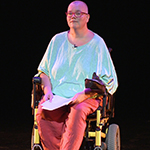Skate Queen
When Mary Ellen’s left breast grew back on its own suddenly on Saturday during dinner break, that’s when we had confirmation that something weird was happening.
It was between shifts – a private Cub Scout party had just left but our Saturday Night Late Skate didn’t open for another two hours. “Wasted Skate” was our own little staff secret – two hours to kill and a 24 pack of Old Milwaukee because these days we weren’t likely to party after closing ‘er down and more likely to collapse a lung trying to hurdle the mop bucket like we used to twenty years back.
Mary Ellen’s mastectomy scar had been hurting something crazy all night, she’d said. I’d spied her from the DJ booth, touching the pack of Virginia Slims she carried in a jeweled leather pouch in her breast pocket as though the stiff cardboard was poking her scar. She had limped off the rink slowly, her whole left arm collapsed against her side. We were all pretty used to Mary Ellen disappearing from time to time, between the smoke breaks and her chemo panics, you just trusted she’d pop back before you missed her.
Vera had gone into the restroom to pee and caught Mary Ellen with her blouse open, not even in a stall. Mary Ellen was inspecting the scar that had taken residence where her nipple used to be. The angry red puckered monster was scabbed and weeping, even though it had been healed over for seven months. She told Vera that she figured there was nothing to do until the late skate was done, so she popped an Advil and then I happened to play a particularly lovely ELO flashback mega mix, which coaxed her back onto the rink. Then during the swelling of the Moog organ, Mary Ellen took a nasty spill in the back turn. She was usually a ballerina on her Riedell quads, so my first thought was that one of those little Cub Scout cocksuckers had left a lollipop stick on the rink surface. I rolled over to help her up and she reached into her blouse and pulled out her falsie, then felt up her reunited cancer-riddled titty.
Nothing made sense, but when you’re staring at a breast that defied all reasoning, you start adding up all the facts real quick. We all started comparing notes. It wasn’t just Mary Ellen’s prodigal breast. Vera pointed out that she was somehow gaining three pounds a shift, even though she’d cut back to 672 calories a day, a precise number because it consisted of three Kessler and Diet Cokes plus two dry pieces of toasted diet bread. Each of us had held onto the observation that our fingernails weren’t growing as fast as they used to… weren’t growing at all, actually. We’d all hoarded that secret shame, a piercing knowledge that our worst fears were finally coming home to roost, that all the years of abuse and pharmaceutical recreation and our bodies had finally called a time out. Turns out, after twenty, thirty years of taking care of the rink, that old rink had decided to return the favor.
Randy thought we were all full of shit, but then after five laps to Michael Jackson’s Thriller, he felt the memory of his bruised shin return just like he’d only just slammed the car door shut on it that second. The skin was a mean purple but after two more laps, the pain and the bruise were both gone. Then he fell to the ground, skates splayed out in front of him, bent his head and said Hail Marys until The Year of the Cat ended.
Time Passages by Al Stewart seemed to have the best effect, although anything by Fogleberg or Alan Parson’s Project worked good too. The BeeGees worked a little too well, if you know what I mean, made our eyes feel swimmy, like our brains were remapping the colors and state capitals. It might have been the disco ball — hanging there since the Rolla-Rena opened in 1972. Or it might have been the skates, an aggregation of forty years of foot sweat and popped blisters reaching critical mass, leaking back up through our soles. Or it might just have been the new formulation of the blue raspberry slushie that we were testing out, a blend of high fructose corn syrup, energy drink and enough blue flavoring to make it glow under the black lights.
Kyle made us stop every five minutes and measured the length of our hair and fingernails, and asked us a few questions that had no rhyme or reason. Did we need to go to the bathroom? Did we feel tingling in our extremities? What day was it? What year was it? What was three times four? How did you spell “shish kebob”? Randy didn’t know how to spell it but the fact that he consistently misspelled it was good enough for Kyle.
After an hour, Kyle had massed some data to form a few hypothesis: counterclockwise worked, and clockwise didn’t. The disco ball needed to be spinning, but the data was inconclusive whether the laser beams had any effect. There was some backfeed with more modern music, but heavy synths from the early 80s seemed to have the best return on our time investment. The rink was erasing anywhere between a day to a week every time you circled. Your body was getting younger, going back through time, anywhere from a week to a month in the spread of five minutes.
As soon as we put a calculation to it, we all shut up and started skating real fast.
My calves felt itchy, unused, a sense of growth in my spine. Somewhere in the last decade, I had gotten an inch shorter. Spine compression, my doc said, talking about the vitamins that were leeching out of my bloodstream, how my bones belonged to a man twice my age. Now I felt taller.
We all should have been winded from skating miles around the rink, but each lap felt like a new start, as though it erased the one before it and we were starting with a fresh day. Running around the rink without skates on didn’t seem to do anything. Kyle had a theory about spatial contact and rogue soundwaves that no one cared to listen to. I needed to do more laps. We all needed to. Time might have been running out for all we knew.
“We should close the rink.”
“Are oh eye!” Kyle tapped his data sheet with the tip of a chewed pen, as though we were paying attention.
“We can’t tell anyone else about this,” I said, pointedly staring at Randy who concentrated on tightening and retightening his laces. Randy was on probation already. He could get sent back to jail for even being near all these kids. We just made sure he was never alone with any of them.
“What are we going to tell the owner?” Vera’s buttons were straining – I hadn’t noticed that she’d been slowly losing weight over the last few years, but she looked healthier, had to have rolled back six months or more at that point.
“Asbestos mitigation,” Kyle said, squinting. The boy had a tick of some sort, and soft supple hips that reminded me of slow dancing. He held a pair of skates by the laces, the way you might hold a dead rat.
“Them kids,” Vera said, fiddling with her heart monitor wristwatch. “What’s it going to do to them? How many times does a kid skate around a rink? Twenty? Thirty?”
The implications were tough – losing twenty or thirty days was nothing for used up bodies like ours but kids, that was a different story. The potty training gone to hell, the forgotten ability to tie their own shoes. We all looked around and nodded, half thinking about the children, and not wanting to admit that we were also thinking about having more time on the rink. Or less time, if you think about it that way.
Vera was flipping through the events calendar. “Derby.”
The derby team practiced at the ‘rena every Saturday and Tuesday and could really rack up the rotations: A lot of strong lesbians who couldn’t even get on the team unless they could circle the rink 25 times in five minutes. They’d unage a year in a single practice session. They’d use up the rink and all that youth juice would be gone, quicker than snot.
Vera made us all do pinky swears, for the lack of a suitable bible. “For now,” we said, as though we’d make any other decision until the miracle of the rink stopped working. We made a sign off the clean side of a Dr. Pepper box:
Asbestos!
“TBA”
Normally, you don’t think about how many times you do laps. If you do, you start to get a little dizzy, go all Camus about the futility of the situation.
Your laces on the right side start to get loose, from always turning against them. Normally I switch it up, do a little fancy footwork and skate backwards for a bit, but what if that turned the transdermal youthificationwhatever- it-was off? What if I sped up time instead of reversing it and my face melted off like the Nazis when they opened the Arc of the Covenant?
We had been so excited about the discovery that we didn’t notice that Mary Ellen still hadn’t come back from the bathroom after her breast reunited with its beautiful partner. I could see her through the little window in the DJ booth, whenever I’d go in to change the songs. She was standing out back behind the dumpster in her stocking feet, taking long drags off her cigarette, occasionally touching her left breast, feeling for the area where there had been a lump. Or still was a lump again. She had a slushie cup that she was using as an ashtray, the used butts collected in blue raspberry melt. I threw on the soundtrack to Xanadu. I could hear Kyle asking Randy if he thought the rink could be used for other means, philosophical questions. “Just bring a lady here for a friendly skate. She wouldn’t even feel it. She wouldn’t even need to know what was happening. The thing would just be gone. Just skated out of reality, are you feeling me? And then a brother would be off the hook and it wouldn’t be a sin. This is God’s way – this is an act of God, you get what I’m saying?” Randy was muttering and making negative sounds.
I rubbed my bicep. The skin didn’t feel as rubbery. When had it gotten rubbery? I hadn’t noticed, sometime over the last five years, apparently. Mary Ellen needed to get in on this, more than any of us. I leaned my head out the backdoor, feeling the rise of OLJ’s sweet vocals pulling me to skate.
“You coming in and knocking down some laps?” I was careful to not let my skates hit the pavement, my front wheels locked over the doorlock. The owner was insane about the chastity of the skate floor: We swore she could spot street grit through sixth sense but I also didn’t want to impact the sanctity of the connection between the skates and the unending oval time rift that we were freestyling on.
“Diet Coke. Tasted like dirt or needles for so long after the chemo. It just started tasting right a few weeks ago.” Her hand went to touch her left breast but then stopped in midair.
“The tum– lumps are back?” As easy as it was to believe that roller-skating had regrown tissue.
The question loitered between us in the alley. If you didn’t know better, you’d never believe she was the girl in the oxidized photos from the 80s that still hung in the rink locker room. Somewhere along the way, her forehead had cast a long divot between her eyebrows and a constellation of pock marks on her chin and cheek from god only knows what. A feather of a scar curved down from the corner of her lip, so soft and light it seemed that it was a missed spot of lipstick – Mary Ellen had taken a headfirst dive off a boyfriend’s Harley about a decade back. She probably should have gotten stitches, she figured, but the boyfriend had been drinking and doing a little pharmaceutical, so they didn’t dare go into the ER. Then he dumped her a month later, saying that he lost his boner when he looked at her ruined face.
And now I’d get to see the lady unspool, undo the decline of the 10’s and the pessimism of the 90’s. Roll back through the hip hop years, slide into the grunge and then coast into synth pop looking fine in her Levis. I’d only been nine or ten when I first started coming to the rink but Mary Ellen’s clipped business voice as she dished out your skates, followed by her amazing sideways and trick footwork during the slow periods, I cursed our age difference and vowed to marry her someday. Of course, somehow we never managed – Back then I’d practiced my tricks and jumps, and then came the war and the sand and put the rink behind me. When I was working my way off the needles, during the worst of the anhedonia, I’d get a beautiful vision of her swishing in through the brain fog, a blur of satin tight pants and lip-gloss. Had to look her up once I made it past the night sweats and ended up with a job that was meant to last me for a while. That was over a decade ago. Sometimes it’s too easy being easy.
A shout erupted from the rink, over the sweet mellow licks of Olivia Newton-John’s vocal Xanax. I skated back over the carpeted rink hump to the center, where Kyle was curled into a fetal position, as though gut punched. Randy and Vera hovered over him nervously.
Kyle struggled to his knees and then dry heaved onto the rink, letting one sinew of spit slowly slide towards the floor and then had the grace to catch it with his hand and wipe it on his pants. He motioned for a pull up and we all stood in awkward quiet, and looked at Randy, who was the lowest on our pecking order, the one who knew that he’d be kicked out if he made himself even a tiny pain in the ass. Randy obliged and then stuck his hands in the front pockets of his Levis for a discrete wipe.
“Don’t skate too close to the epicenter,” Kyle finally said. “It really fucking sucks.”
His eyebrows were completely gone, and his hair had gone all short and bristly. He limped back to the side, picked up his reporters notebook and fell onto the nearest bench. Above us, the disco ball was an unblinking eye.
Dancing Queen queued automatically, as though the ancient MP3 shuffler was making an editorial comment, urging us to continue to circle circle circle. Vera squealed in approval of the song selection and shoved off, hugging the wall. Her pale doughy stomach peeped out where her shirt had popped a button. Judging by the size of her ass, she had to be coasting back into the winter months of three years ago, when she’d been her heaviest. She skated with a need to feel her jeans get looser; to know that she was skating closer and closer to some version of herself that loved her thighs.
Mary Ellen had come back in and was carrying her skates back over to the bench. I watched her for a minute to see if she was going to put them back on, but it seemed like she wasn’t sure either.
“Hey.”
“Hey.” Her face had gone slack and sallow, her eyes bright. A few times, Randy mentioned that he thought Mary Ellen was tweaked. She had never seemed that way to me. Now a sweetness clung to her, like burnt cinnamon and old hair spray. We always thought the crack pipes we’d found in the back alley were from the hobos that liked to dig through the rink’s garbage for half-eaten SuperRopes. Maybe they weren’t.
Randy skated past us and shouted “Woo!” as Madonna’s “Like a Virgin” automatically played. It was Randy’s theme song. He got a little too excited about heavy innuendo music and songs usually made us uncomfortable but in my quest for early 80’s music, I had forgotten to remove it from the playlist. Maybe we were all involved in some kind of collective acid trip. Maybe there was a mold in the skate rink, the one that made the girls in Salem all get tried as witches. Did they think they were getting younger? Did they imagine that body parts grew back on their own?
“Eben!” shouted Vera across the rink. “No Madonna! Madonna doesn’t work!” She had ditched her blouse and was now wearing just her bra, her body glistening with sweat. Randy was taking in the sights, weaving behind her like a mako shark behind a seal.
Kyle’s entire skull seeming to glow under its skin. I pushed off the wall with enough force to ruffle the Coke advertisements stuck to the side. For lack of anything better to do, I hit the rink, being careful to take it along the edges, getting no more than a stride inside the invisible line. Lava! Hot lava! A child’s voice played in my head. Going back a day at a time seemed a safe rate. Best not to screw with the natural order too much. Dabbling, was what we were doing. Dabbling. Nothing serious. Nothing like Mary Ellen’s consequences.
What you forget to think about is the logistics of the situation. You couldn’t think about it, you’d want it too badly. Instead you think about the hairline you had when you were seventeen, you think about the way you could stroke off forty times a day and only because you had to sleep and go to school during the rest of the time. You think about how each of your coworkers were skating back days they already spent inside this former fall-out shelter, spinning hot dogs on heated spindles and handing out skeeball tickets to 8-year-olds. You think about how you could do things over — if you could go back again — you could ask Mary Ellen for a date. And then she wouldn’t ever have to date criminals and assholes and take up smoking and get cancer and a ruined face and a mouth that had formed a perpetual frown over time, like tire ruts in a gravel driveway. Enough time and you could go to college with the incoming freshmen, get a real degree and not some late-night-television infomercial certificate of technology that didn’t mean nothing when you actually tried to get a job somewhere that needed a resume instead of a paper application.
Mary Ellen had her purse on her shoulder and was clipping her lighter to her jeweled leather cigarette pouch, the conclusive movement that signaled the end of every shift since I’d known her.
“You’re not going to skate no more?” I shouted over The Hollies The Air That I Breathe.
She shook her head and smashed her lips together, then bumped the door open with her butt and for a moment, she was cast in shadow, backlit by the golden cast of an orange sunset. She paused again and I skated over the carpet, reaching to steady myself at the cashier’s table. The front wheel of my skate kissed the entryway but she had already walked backwards into the parking lot.

Wendy Wimmer teaches journalism and advertising at Lakeland University and also is an editor at VentureBeat. Her fiction has appeared in Barrelhouse, Per Contra, Blackbird, Waxwing, and more. She is an assistant fiction editor at Barrelhouse and once touched Andre the Giant’s arm. It was amazing. She’s on Twitter sporadically @wendywimmer and even less frequently at wendywimmer.com.



